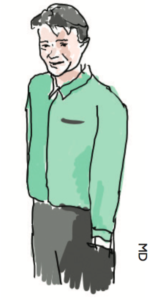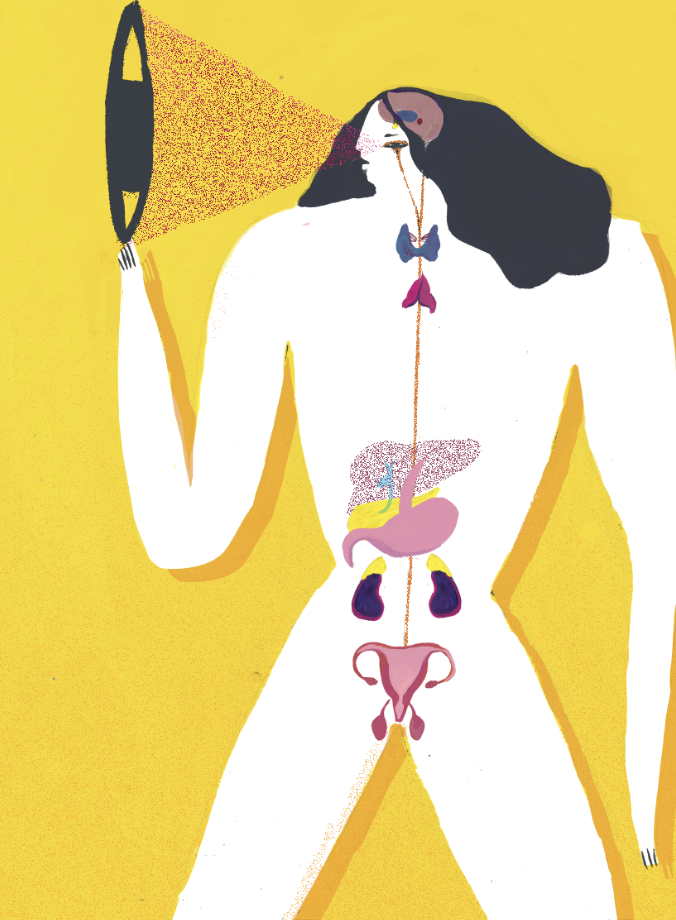TUESDAY, 4 JULY 2017
Psychiatry is changing. Historically, the field has been dynamic, undergoing transformation as institutions and asylums have come in and out of fashion. Over the last century, the Diagnostic and Statistical Manual of Mental Disorders (DSM), a handbook of checklists by which psychiatrists can make diagnoses, has been overhauled time and time again. The DSM is a controversial manual.
Many disorders overlap, and the requirements for diagnosis can seem arbitrary, reflecting how little is known about the causes of mental illness. But behind the diagnostic tools, researchers are changing the way they approach the difficulties of understanding the mind.
Neurology, psychology and psychiatry are no longer distinct and independent fields. Collaborations with geneticists and immunologists are increasingly common.
Professor Paul Fletcher has seen first-hand the changing attitudes in the field. He initially trained to be a medical doctor, specialising in psychiatry. “When I was a junior doctor, there was not much cooperation, not much common ground between psychiatry and neurology – not even psychiatry and psychology. But the development of neural imaging has led to psychiatrists and neurologists being in the same room and looking at the same problem. There is more recognition that both have something to say about the mind- brain interface.”
Fletcher is himself a prime example of interdepartmental cooperation. His original research interest was psychosis – how the perceptions and beliefs of his patients changed to produce delusions and hallucinations.
“Being a clinician was unsatisfying. Of course, it felt rewarding, but none of us knew what the heck we were talking about.”
Frustrated with the knowledge gap between diagnoses and the underlying causes of symptoms, Fletcher followed his curiosity down the rabbit hole of cognitive neuroscience, even administering the class B drug ketamine to volunteers to model the distortions of reality often experienced in schizophrenia. Since 2008, Fletcher has held the position of Bernard-Wolfe Professor of Health Neuroscience at Cambridge. Alongside his ongoing research into the mechanisms of psychosis, Fletcher is now exploring how humans make choices about food, with implications for understanding obesity and binge-eating.
 Olivia Healy
Olivia HealyHearing voices and filling a trolley at the supermarket - what links these seemingly disparate experiences? “Being interested in psychiatry, in what it is to be irrational, psychotic, led me to normative research on human learning, judgement and decision- making, and got me interested in rewards processing, predictive coding, those sorts of ideas, applied to psychosis,” says Fletcher.
“The same sorts of mechanisms underlie food choices – we often make irrational decisions, and do things that are not good for our health, but why is that? Rewards processing and motivation are a way of understanding food behaviours, why people are engaged by external stimuli to then engage in certain behaviours.”
A tool that Professor Fletcher and his colleagues use to guide them in both areas of research is a ‘predictive coding model’ of the brain. The model is one of several ways of explaining how the brain makes sense of the perplexing array of incoming sensory information - non-stop light waves, sound waves, temperatures, vibrations and so on. Some information is filtered out if it meets our expectations based on previous experiences. Signals that do not fit the prediction can receive attention. In psychosis, a slight shift in the predictive coding may lead to unimportant stimuli seeming highly significant, which may explain why some people become convinced that the newsreaders on TV are speaking directly to them, or that their internal thoughts are being projected out loud. In health neuroscience, the predictions that influence future choices are updated every time you enjoy a meal and feel full, modifying your expectations about the food you choose. “What does it mean to feel full? It isn’t a full stomach. It’s a change in sensory input, associated with not being able to eat anymore.” So Fletcher and his colleagues investigate, amongst other things, how predictions based on prior experiences can modulate that sensory input of fullness.
The research done under the Bernard-Wolfe Health and Neuroscience fund may be led by a psychiatrist, but it requires a diverse team. Fletcher works alongside neurologists and endocrinologists, and is painfully aware of how narrow his early training was. During a medical degree, students spend several weeks on a placement of their own organising, doing something related to medicine almost anywhere. Fletcher spent his elective on a psychiatry placement. “In retrospect, it was far too early. People should look around medicine as much as possible. I was encouraged to pin my colours to a particular mast, but I think it would have been good to do something in surgery.” Surgery seems a surprising digression for a psychiatrist, but Fletcher thinks a broad knowledge is important. “It is known that physical health can lead to mental problems. It would be good to know more about the body.”
To bridge the gap in understanding between tiny neurochemical changes and actual human behaviour, it is important to recognise that the mind is not separate from the body, or even from the brain. Experts in brain structure and activity, hormones, or genes are pitching in to contribute their knowledge to the study of the mind. Recently, an invitation to psychiatry research has been extended to immunologists, who study how the body responds to infection.
 Oran Maguire
Oran MaguireIf the symptoms of depression are attributed to inflammation of the brain, then future antidepressant medicines could become far more effective by targeting inflammatory molecules. The growth of ‘immunopsychiatry’ excites Fletcher. “I fantasise that there will be opportunities for junior doctors to study two fields as one.”
Professor Fletcher hopes that the different science departments will be able to bridge the gap in knowledge together. “Has my work changed clinical practice? That’s an unequivocal no. The gap is huge.” But is it possible? Fletcher thinks so. “Ultimately, I have to say yes. But I have a slight fear that, just because we’re heading in the right direction, it doesn’t mean that we’ll get there. I may want to reach the moon, and if I climb a tree, I can get a little closer, but it doesn’t mean that I’ll reach it that way.” Psychiatry will never reach the moon in isolation. As Fletcher says, the gap is huge, and it will take an interdisciplinary approach to make it any smaller.
Banner image credit: pneumaticpost
